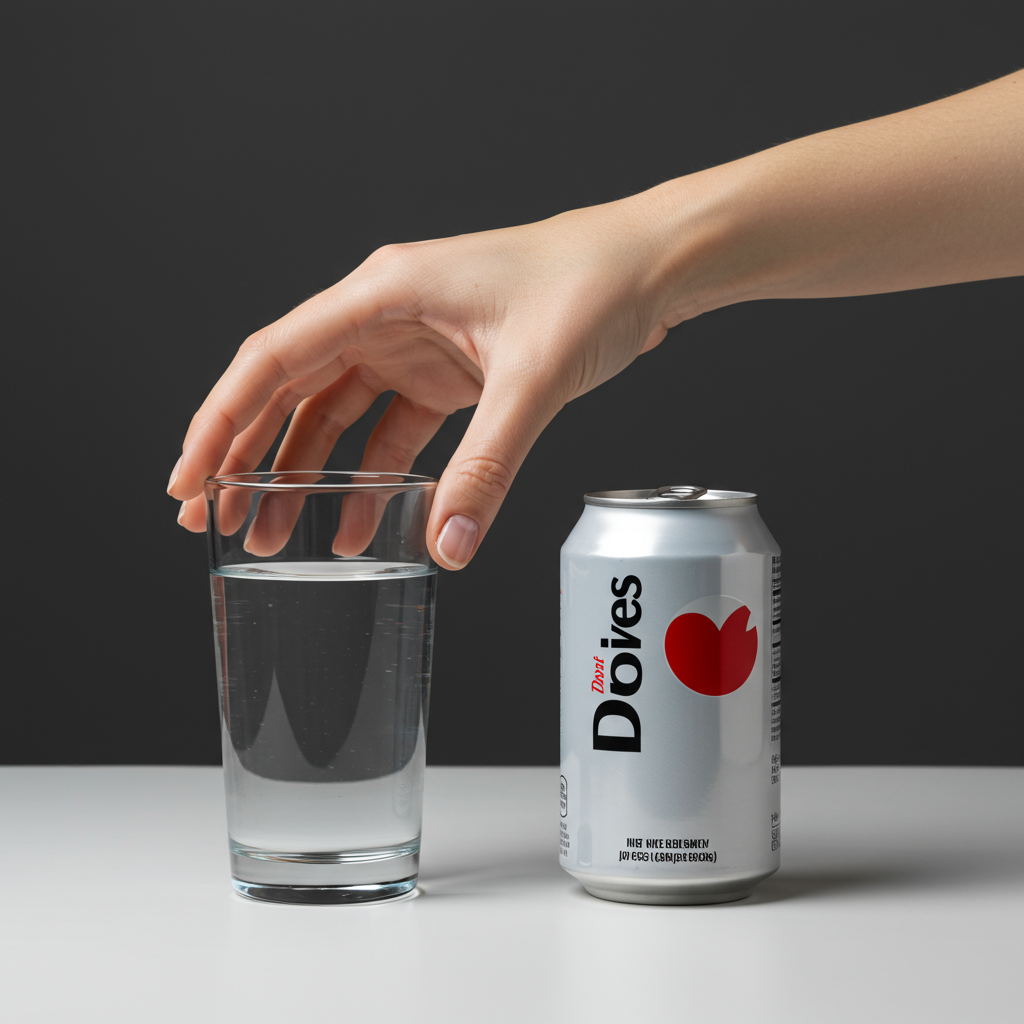For women managing type 2 diabetes, making one simple change to your daily routine could have a profound impact on your health: swapping diet drinks for plain water. New research offers compelling evidence that this easy substitution can lead to greater weight loss and significantly increase the chances of putting type 2 diabetes into remission. This finding challenges the common assumption that calorie-free diet sodas are harmless for managing blood sugar and body weight. It underscores water’s vital role as a cornerstone of effective diabetes care and overall well-being.
The Study: Water vs. Diet Drinks for Diabetes Remission
A recent study, presented at the American Diabetes Association (ADA) meeting, focused specifically on the dietary choices of women with type 2 diabetes. Researchers wanted to see if replacing diet beverages with water would make a difference in weight and diabetes status. The study included 81 women diagnosed with type 2 diabetes. Participants followed a structured health program over 18 months. This included an initial six-month phase focused on weight loss, followed by a full year dedicated to weight maintenance.
Throughout the entire study period, the women were divided into two groups. One group was instructed to drink plain water as their primary beverage. The other group continued to consume diet drinks. The results observed between these two groups were striking.
Key Findings: Weight Loss and Remission Rates
The difference in outcomes between the water-drinking group and the diet beverage group was substantial. Women who drank water experienced notably greater weight loss. On average, participants in the water group lost approximately 15 pounds. In comparison, women in the diet drinks group lost roughly 10 pounds. This 5-pound difference highlights water’s potential advantage for weight management in this population.
Perhaps even more significantly, the study revealed a dramatic difference in type 2 diabetes remission rates. Remission means achieving and maintaining normal blood sugar levels without diabetes medication. A remarkable 90% of the women in the water-drinking group achieved type 2 diabetes remission. In stark contrast, only 45% of the women who drank diet beverages put their condition into remission. These results suggest that choosing water could more than double a woman’s chances of reversing type 2 diabetes compared to opting for diet drinks.
Dr. Hamid Farshchi, the study’s first author, commented on the findings. He stated these results directly challenge the widespread belief in the US that diet drinks have no negative effects on managing weight and blood sugar. The research team suggests that despite having zero calories, diet drinks may still negatively impact the body in ways that hinder diabetes management.
Why Water May Be Better Than Diet Drinks
While diet drinks contain artificial sweeteners and zero or very few calories, accumulating research points to potential negative effects. Previous studies have suggested that a high intake of artificial sweeteners could even contribute to triggering type 2 diabetes in some individuals. The exact mechanisms are still being researched. Theories include effects on gut bacteria, changes in how the body perceives sweetness, or impacts on insulin response. The fact that 1 in 5 Americans consumes a diet drink daily, according to the US Centers for Disease Control and Prevention (CDC), makes understanding these potential impacts incredibly important for public health.
Water’s Proven Benefits for Health and Blood Sugar
Water, on the other hand, offers well-documented health advantages without these potential downsides. Staying adequately hydrated is fundamental for numerous bodily functions. Beyond general health, increasing water intake has been linked to specific benefits relevant to diabetes management.
Research reviews indicate that drinking more water can significantly aid weight loss efforts. Some studies have shown that people who increased their water intake lost 44% to 100% more weight compared to control groups. This supports the weight loss findings in the recent study on women with type 2 diabetes.
Furthermore, in people with type 2 diabetes, drinking extra water has been associated with decreased fasting blood sugar levels. One theory is that higher fluid intake increases blood volume, helping to dilute the concentration of glucose in the bloodstream. While more extensive randomized trials are needed to fully confirm these effects across all populations, the signals are promising.
Other benefits of adequate hydration include a reduced risk of kidney stones and potential improvements for conditions like recurrent urinary tract infections. Hydration supports overall metabolic health.
Integrating Water into Your Diabetes Management Plan
The findings from this study and broader hydration research reinforce that choosing water is a simple yet powerful strategy for managing type 2 diabetes. It’s not about finding a magic bullet but making a foundational healthy choice. Water fits perfectly into a holistic approach to diabetes care, which includes meal planning, physical activity, and maintaining a healthy weight.
Experts often recommend specific daily fluid intake targets, generally suggesting around 13 cups for men and 9 cups for women, which includes fluid from foods like fruits and vegetables. However, individual needs vary based on body size, activity level, climate, and health conditions. A practical approach is to listen to your body’s thirst cues. You can also monitor urine color (aiming for light, like lemonade) and frequency (every two to three hours) as indicators of optimal hydration.
For people with diabetes, proper hydration, particularly with water, is crucial during physical activity. Exercise helps lower blood glucose levels, but it also increases fluid needs. Staying hydrated with water during workouts supports this process safely.
Simple Steps to Increase Water Intake
Making the swap from diet drinks to water doesn’t have to be difficult. Here are some simple ways to increase your water consumption throughout the day:
Start your day with a glass of water.
Keep a reusable water bottle with you and refill it often.
Drink water before each meal.
Flavor your water naturally with slices of lemon, lime, cucumber, or berries.
Choose water instead of diet soda, juice, or other sweetened beverages at meals and snacks.
Use hydration tracking apps or set reminders.
Remember, while increasing water intake is generally safe and beneficial for most people, those with certain medical conditions, such as specific heart issues or kidney problems, should consult their healthcare provider about appropriate fluid levels. Always discuss significant dietary or lifestyle changes with your diabetes care team.
Frequently Asked Questions
What did the study reveal about how water affects type 2 diabetes in women compared to diet drinks?
A recent study presented at the American Diabetes Association found significant differences. Women with type 2 diabetes who drank water as their primary beverage lost more weight (average 15 lbs) compared to those drinking diet drinks (average 10 lbs). More importantly, 90% of the water drinkers achieved diabetes remission, while only 45% of diet drink consumers did. This suggests water is substantially more beneficial for managing the condition and achieving remission than diet alternatives.
Why might diet drinks be less effective for managing type 2 diabetes despite being calorie-free?
While the exact reasons are still being explored, research suggests diet drinks, often containing artificial sweeteners, may negatively impact metabolic health. Previous studies have linked high artificial sweetener intake to potentially triggering type 2 diabetes. Some theories propose effects on gut bacteria or insulin response, although more research is needed. The study authors suggest that even without calories, these beverages can hinder weight and blood sugar management efforts.
How can someone with type 2 diabetes successfully switch from diet drinks to water and stay hydrated?
Making the switch is a simple but impactful lifestyle change. Start by gradually replacing one diet drink a day with water. Keep water accessible by carrying a reusable bottle. Drink water before meals and snacks. Flavor water naturally with fruit if plain water is unappealing. Pay attention to thirst and urine color as guides. Integrate water intake with physical activity, essential for diabetes management. Always discuss hydration goals with your healthcare provider, especially if you have other health conditions.
Conclusion
The latest research offers clear evidence that swapping diet drinks for water provides significant benefits for women with type 2 diabetes, leading to greater weight loss and a much higher likelihood of achieving remission. This finding serves as a powerful reminder of water’s fundamental importance for health, especially for individuals managing blood sugar. While diet drinks might seem like a harmless alternative to sugary beverages, their potential negative impacts on metabolic health warrant caution. Choosing water is a simple, accessible, and proven strategy that complements other healthy lifestyle choices. Prioritizing adequate hydration with plain water is a small change with the potential for a big impact on long-term type 2 diabetes outcomes and overall well-being.



